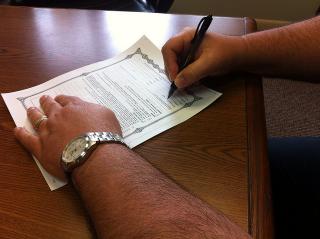 What happens if you die without a will?
What happens if you die without a will?
When a person dies without a will, it is referred to as dying "intestate". The state is, therefore, responsible for deciding how the property is distributed. In a case of a community property state, the property is given to the spouse or (domestic partner as practiced in some states). It follows that any property owned as joint tenancy would be granted automatically to the joint owner. However, any property held in trust is supposed to go to the beneficiaries, but it is first subject to the spouse's share in some states.
Each state formulates its laws regarding how intestacy works. It is, however, possible for your property to be distributed in the following ways:
- If the deceased had a spouse and children, the property is therefore divided among them.
- If you have parents and spouse but are without children, some states share the property between the parents and spouse while others give all to the spouse.
- If you have children but are without a spouse, the child would automatically get the property.
- Some states give the property to the parents if you have no spouse or children and other states share some of the property to the brothers and sisters.
- If you have no nuclear family including brothers, sisters, and parents your property would then be distributed to uncles, aunts, nephews, and grandparents in that order.
- In a case where there is no one to give the property it would then become the assets of the state on where you reside.
What are the legal requirements of the last will?
A probate court will only legally enforce the last will when the following conditions are followed:
- Free will – before you sign the last will, you must be acting without undue influence or duress from others. You have to act on your accord.
- Sound mind – you must be of sound mind.
- Sign in front of witnesses – the last will must show the signature and the date occurred in front of at least two people who must not be related to you and not a party to benefit from the last will.
It is not a must for the last will to be notarized but some states allow the last will to 'self-prove' itself. A "self-proving" last will is one that is attached to the notarized affidavit that declares the will was duly witnessed and singed and that it is the last will of the undersigned. In that case, there is no need to locate the witnesses of the last will. Most states allow a last will that is either typewritten or computer generated.
What does a will do?
A will enables you to have the sole discretion over the distribution of your assets. It lets you decide who gets what in all your belongings such as family heirlooms, cars, real estate and securities and how it should be distributed. In the case of investment securities, a will commands a smooth transition of these assets. A will is of particular importance in providing care for your children. A will minimizes tensions between the survivors. Without a will, relatives may battle over your possessions which can weaken what may have been an otherwise strong family. If your work involves charity, a will lets you decide what assets will be allocated to the charity of your choice.
While a will is supposed to address how your assets will be shared, there are some items that are not covered in the will's instructions. These items include community property, retirement assets, proceeds from life insurance policy payouts, assets owned as joint tenants and investment accounts.
What a will can't do?
There are a number of things a will cannot do, including leaving some types of property and investments such as:
- The property you hold in joint tenancy with some else or community property.
- Property transferred to a living trust.
- Life insurance policy that has a beneficiary.
- Individual retirement account (IRA) or money in the pension plan in which you have named a beneficiary.
- Property held by beneficiary
- All money in a payable-on-death bank account.
On top of property and investments, there are even more things a will does not encompass:
- Leaving funeral instructions – since a will is typically read or found weeks after death, it cannot be used to plan the funeral. The best way is to make a separate document telling your executor where to find it.
- Reducing Estate Taxes – A will cannot help you avoid taxes. However, many types of trusts can either reduce or postpone the tax bill.
- Avoiding Probate – A will cannot contribute to avoiding probate. Property left through a will may spend several months or a year in probate before it is then distributed to the people supposed to inherit it.
- Putting certain conditions in gifts – there are limitations on the conditions you can put on gifts, for instance, the conditions cannot involve marriage, divorce or change of religion but it may involve other things.
- Leaving money for an illegal purpose – it is rare to find such cases and a will cannot be enforced for an illegal purpose.
- Arranging care for a beneficiary with special needs – A will is not the best way to provide long-term care for someone. The best way is to set up a trust tailored to the needs of the beneficiary.
- Leaving money to pets – A will cannot be used as a way to leave money to pets. You may leave pets to someone who has agreed to take care of them and leave money to the person to enable him/her to cater for the expenses.
How do I execute a will?
Executing a will may begin as soon as the will is filed in the probate court. The filling can also be done as soon as the testator has passed away. It is usually in the beneficiaries' best interests to file the will in the probate court as soon as possible since it may take several months. After the death, the executors are expected to step into action and start executing the testament will immediately, as soon as the funeral arrangements are over. The critical part is to ensure the executor has the most recent copy of the will also referred to as the last will.
The death must be registered in a legal register office, and usually, a medical certificate is issued detailing the cause of death and the proof of the deceased's identity.
The executor's responsibilities
Naming the executor of someone's estate to perform the execution of a will is usually a very complex and time-consuming process. Some of the responsibilities carried out by the executor include announcing the death mainly to the family and friends and to any business associates. It is usually undertaken in a written form and is followed by obtaining the medical certificate stating the cause of death. The executor is responsible for planning the funeral, gathering and documenting the estate, and obtaining a grant of probate.
To execute a will, it has to be filed with the probate court. Usually, the work of filling is left to the executor, but some states require that someone who was staying with the deceased person be the one to file the will.
What is a Trust?
A trust has traditionally been used as a way to minimize the estate taxes and other benefits as part of a well-crafted estate plan. It is usually an arrangement with a third party called a trustee to hold assets on behalf of the beneficiaries. The agreement specifies how and when exactly assets pass to the recipients. One of the benefits of using a trust is that they avoid probate hence making it easier for the beneficiaries of your property to gain access to the assets more quickly than transfer using a will. In the case of an irrevocable trust, it is then exempted from the taxable estate and hence fewer taxes may be paid upon your death.
Other benefits include:
Protection of your legacy
When you leave your property to a properly constructed trust it is helpful in protecting your estate from creditors and beneficiaries who may not be able to take the role of asset management.
Control of your wealth
In the case of a trust, it is easier to specify the terms precisely including when and whom your asset distributions should go to. Also, you have the option to set up a revocable trust to ensure the trust assets remain accessible to you during your lifetime.
Privacy and probate savings
The process of probate is well known in most areas. In the case of a trust, the assets must not pass through a probate hearing because the matter remains private. In addition to possibly reducing the amount time that could be lost in terms of the court process, it is a way to reduce taxes in the process.
How does life insurance work with my trust?
In the case of an irrevocable life insurance trust, you have more control of your life insurance policies and the money paid. Life insurance trusts help you reduce or completely eliminate taxes to ensure more assets go to your beneficiaries. You need to understand that estate taxes are different from probate expenses or the final income taxes due every year until the year you die. Particularly, federal estate taxes are quite expensive, sometimes amounting to 45-55% and must be paid. The executor of the will is supposed to pay the amount within nine months after your death. If the estate does not have enough cash to pay this amount, it is usually advisable to liquidate some assets to settle the estate taxes.
How does an insurance trust reduce estate taxes?
When there is an insurance trust, it owns your insurance policies for you. Since you do not own the insurance, the incidents of ownerships are not included in your estate thereby reducing the amount of estate taxes to be paid. Since the current exemption to estate taxes stands a t $5 million, you may not need to pay estate taxes.
Can I be sued for errors or mismanagement of my trust?
Errors or mismanagement of the estate and trust can indeed be subject to personal liability. The common ways people mismanage estates and trusts are through refusing to pay tax or not filing returns on time. Mismanagement may also include odd investment choices such as being too speculative, too conservative, or being for one beneficiary over other(s). It could also include allowing the property or casualty insurance to lapse, buying assets for your family from the trust. The best way to ensure you are not on the wrong side of the law is to get professional advice including fully documenting your actions and decisions.
A person does not need to be a beneficiary to complain about a trustee to the investigative agencies. Sometimes, these complaints are seen as nothing more than nuisance and annoyance. Most times it turns out that the complaints are usually meant to compel the trustee to give in to beneficiary's demands. The court is therefore forced to assess the cost against the wrongly complaining beneficiary.
Credits:





